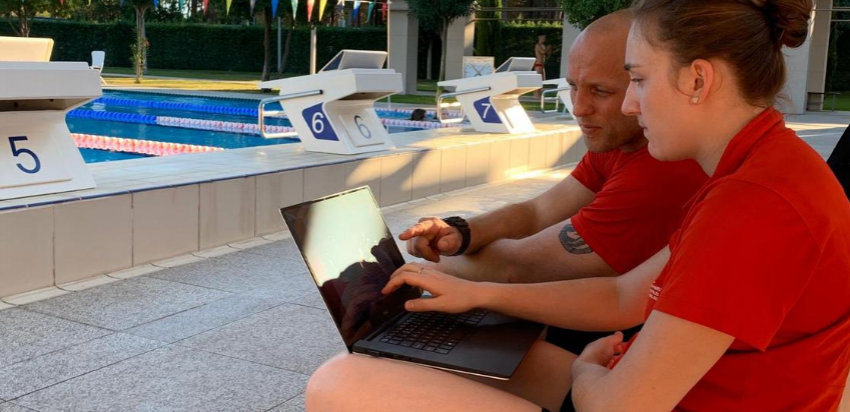Sports science and medicine (SSSM) support and education is provided in a progressive manner throughout the Swim Wales National Squad Pathway. The effective integration of SSSM staff and coaching staff is the key to an effective service and the Swim Wales SSSM team work side by side with the coaches to ensure expertise from a variety of specialist areas and practitioners (such as strength and conditioning, physiotherapy, psychology, nutrition and performance lifestyle) is utilised to impact positively on performance and potential in the pool.
The multi-disciplinary sports science team works closely with the coaching team to support high performance swimmers as they perform at their best on the World stage.
Sports Science
The team includes practitioners from psychology, nutrition, physiotherapy, soft tissue therapy, strength and conditioning, exercise physiology and performance analysis.
Sport Psychology
The aim of sport psychology support is to enable athletes, coaches and staff to excel in training and competition and to develop ‘winning behaviours’. In essence, it is strength & conditioning for the mind, and covers a variety of areas including:
- Develop consistent preparation and recovery to enable excellence when it counts
- Interpret pressure as challenge, not threat
- Manage emotions & arousal: Know ideal training and performance states, and have the skills to switch states appropriately
- Be focused on performance (not fazed by event, or competitors, etc.) & able to refocus quickly
- Demonstrate robust confidence, be mentally tough, and psychologically flexible
- Communicate clearly and effectively
- Reflect, learn and improve
Performance Nutrition
Performance Nutrition is delivered through a range of methods dependent on a swimmer’s squad level, from group education workshops through to individualised nutrition plans around training and competition so that swimmers can have more:
- Time to train: by reducing the risk of injury and illness
- Effective training: by facilitating fuelling, recovery and adaptations to training
- Competition performance: fuelling for race day
Exercise Physiology
Exercise Physiologists work closely with the coaches & swimmers to monitor how the body responds and adapts physiologically to training & competition in order to enhance performance.
Performance Analysis
Performance Analysis is the provision of visual and objective feedback on performance through the use of video footage. This can be used in training and in competition. Feedback is given to the swimmer and coach immediately after the performance, allowing adjustments to be made and reassessed straight away. Performance Analysis in swimming is used to:
- Identify areas of weakness, for example stroke technique and key race skills such as starts and turns
- Provide visual feedback on these areas in the training environment
- Monitor and provide objective feedback on the execution of race skills in competition
Strength & Conditioning
For a swimmer to perform at the highest level, all aspects of training need to be explored and utilised. Strength and Conditioning involves a programmed approach to athletic development on land including mobility, activation, strength and power development. The aim is improved physical performance and movement competency.
Strength and Conditioning helps develop physically robust swimmers who are resistant to injury and who can train and compete to their fullest potential thanks to improved flexibility, mobility, co-ordination, strength, power, speed and endurance.
How does Strength and Conditioning help swimmers?
- Through critical evaluation of the swimmer and the swimmer’s individual events to identify the key physical attributes required for success
- Reduces the amount of time the swimmer is away from training and competition due to injury – Provides an effective prehabilitation programme that encompasses the swimmers individual needs and provides the appropriate consideration for specific stressors to swimming
- Enhanced physical attributes such as strength, power, speed and movement competency to improve swimming efficiency and performance
- Maximises the swimmer’s race and training preparation through an effective land-based pre- and post- pool programme
- Maximises post pool and recovery strategies to facilitate recovery between training sessions and during long competition periods
- Ensures that swimmers are physically and mentally performing at their best
Physiotherapy
The aim of the physiotherapist is twofold. Proactively, they work towards injury prevention. Reactively, they assess and treat injuries, providing rehabilitation to athletes until they are able to return to full participation in training and competition.
In terms of injury prevention, physiotherapists can use a variety of tools (including musculoskeletal screening) specific to each sport and each athlete. Profiling allows identification of any “weak links” or potential areas that could be prone to injury, or simply allows improved movement patterns to aid performance and reduce injury risk.
Physiotherapists work closely with athletes, coach, strength and conditioning coach, sports doctor and soft tissue therapist to identify the tell-tale signs that may lead to injury, and to introduce exercises to address the problem earlier. This approach optimises performance and helps prevent injury and time lost from training or competing.
Soft Tissue Therapy
Soft Tissue Therapy is the management, manipulation and rehabilitation of soft tissues of the body (including muscles, tendons and ligaments) to enhance performance, or promote healing post-injury. Some of its benefits are:
- Specific soft tissue management, manipulation and rehabilitation for optimum sporting performance
- Aiding recovery from and preparation for, training, rehabilitation, competition and travel
- Prevent a predisposition to injury
- Enhance injury recovery/rehabilitation
- Increased flexibility and mobility
- Inhibition of pain and levels of anxiety
